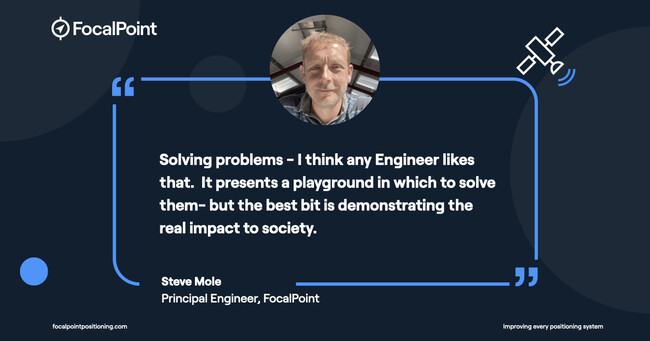GNSS Engineering – the impact it is having on our lives
Ramya Sriram
5 min read
22nd Dec, 2022
GNSS applications

Senior Engineer Steve Mole tells us about the impact he and his team are having and their potential to touch daily lives.
After a degree in Physics and Astrophysics at the University of Manchester, Steve’s GNSS (Global Navigation Satellite System) career started in defence, before transitioning to the commercial sector a few years later. In his early career he was fortunate enough to work for several major GNSS chipset vendors and was truly inspired by his experiences. In this interview Steve tells us what it’s like to work in the field of GNSS and why he loves what he does.
What inspired your early entry into the world of GNSS?
Like most people’s careers, my transition into this sector wasn’t really planned. I was fortunate to have gained a solid foundation of GNSS from working in defence. Some of the first GNSS projects I worked on involved developing the navigation algorithms to automatically land Harrier Jump Jets on ships. It was exciting work and I was able to apply my mathematical and algorithmic capability. After a few years I transferred to the commercial sector where I found the challenges and underlying principles were virtually identical.
Tell us about your work as a GNSS Engineer?
As Engineers we’ve been involved with GNSS satellites since the first was launched in 1978. Whilst the problem of location accuracy is largely solved in many common scenarios there are fundamental challenges with pinpointed precision of the blue dot in urban environments. Whilst it doesn’t seem significant, in reality it could actually make such a significant difference in our daily lives. How many times have you walked out of the tube station only for your map location to be spinning, then realised later that you’ve wasted the last 5 minutes walking up the wrong street? Imagine the impact this could have in an emergency. This is the age-old problem with GPS technologies and at FocalPoint we have solved the problem in this very scenario – where location accuracy is often obscured in built up areas.

What challenges in the role do you enjoy the most?
Engineers tend to love problem solving and I am certainly one of them. At Focal Point our daily challenges involve optimising our software to make it run faster and use less memory – this ensures our overall solution has lower carbon emissions while maintaining the improvement in GNSS accuracy. We act as the technical interface with our customers and commercial teams which requires a deep understanding of both the physics and engineering at the same time.
We’re a wonderfully inclusive team and the opportunities for new and exciting projects are endless. Everyday we are presented with challenges and potential applications of our software from mobile phones, smart watches and in the automotive sector.
You’ve mentioned acting as a core interface between teams as one of the essential skills – what would you say are the others that are essential to the role?
As part of the role you spend a lot of your time collecting data. A core challenge is sharing the right information and formulating the dialogue that matches it. This is an essential and critical part of a project – sharing the right information and translating the results. Being a competent mathematician is a given, a software background is also helpful. Whilst you don’t have to be a whiz in understanding the details of all the hardware – programmatically being able to understand software and the process of software is important and also the ability to apply languages such as MATLAB, Python and C++.
In GNSS it’s actually like most careers – there are no perfect unicorns, just complementary teams. At Focal Point we look for the right competencies and can teach the rest.

Few of the engineering team in our Cambridge Hub
What are the highlights of the role?
Solving problems – I think any Engineer likes that. It presents a playground in which to solve them- but the best bit is demonstrating the real impact to society. You just need to work out what equation you’ve got to solve. This usually is the biggest challenge.
I’ve been humbled by the experiences that this 20+ year career has given me. To anyone starting out, I’d suggest being adaptive and taking advantage of the opportunities as and when they arise. At times you can have a qualitative problem where something doesn’t work and you need to turn that into a technical problem that you can actually solve and optimise. If you ask a thousand engineers, I guarantee 995 will say, solving problems is what defines them. From working in the garden or on a building it’s just a nice feeling to be able to take things apart and put the components back together.
Is there a conventional route to entering a career in GNSS?
Typically a bachelor’s degree in mathematics, computer science, engineering or a science – such as physics is typical. There are many in the industry who have PhD’s however, I don’t and I do not feel less skilled because of it. Actually there are many more transferable skills within a GNSS role – more than you might think, from tech and software; data science even. If you’re numerate, understand software and are a great communicator then you can probably learn the bits that you don’t know. In tackling the skills gap, it’s essential we as a company, and more generally as an industry, work to inspire future generations and to create the opportunities that allow those once unachievable dreams to be realised.
I really feel fortunate to have found my way into an industry where you can impact the lives of hundreds of millions of people that use a location device and make them more accurate.
If you’ve been inspired by the work by Steve and his team and have some of the core competencies being asked for, take a look at our jobs board here.







